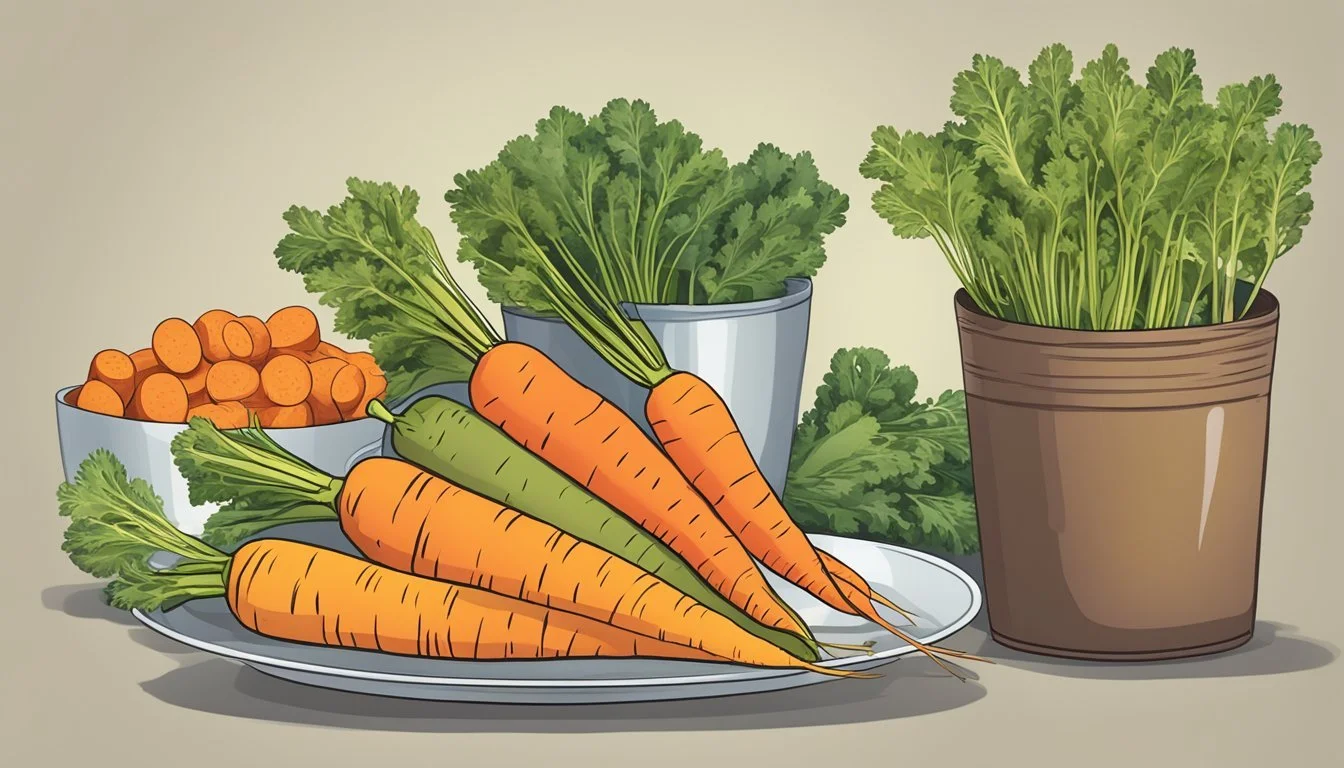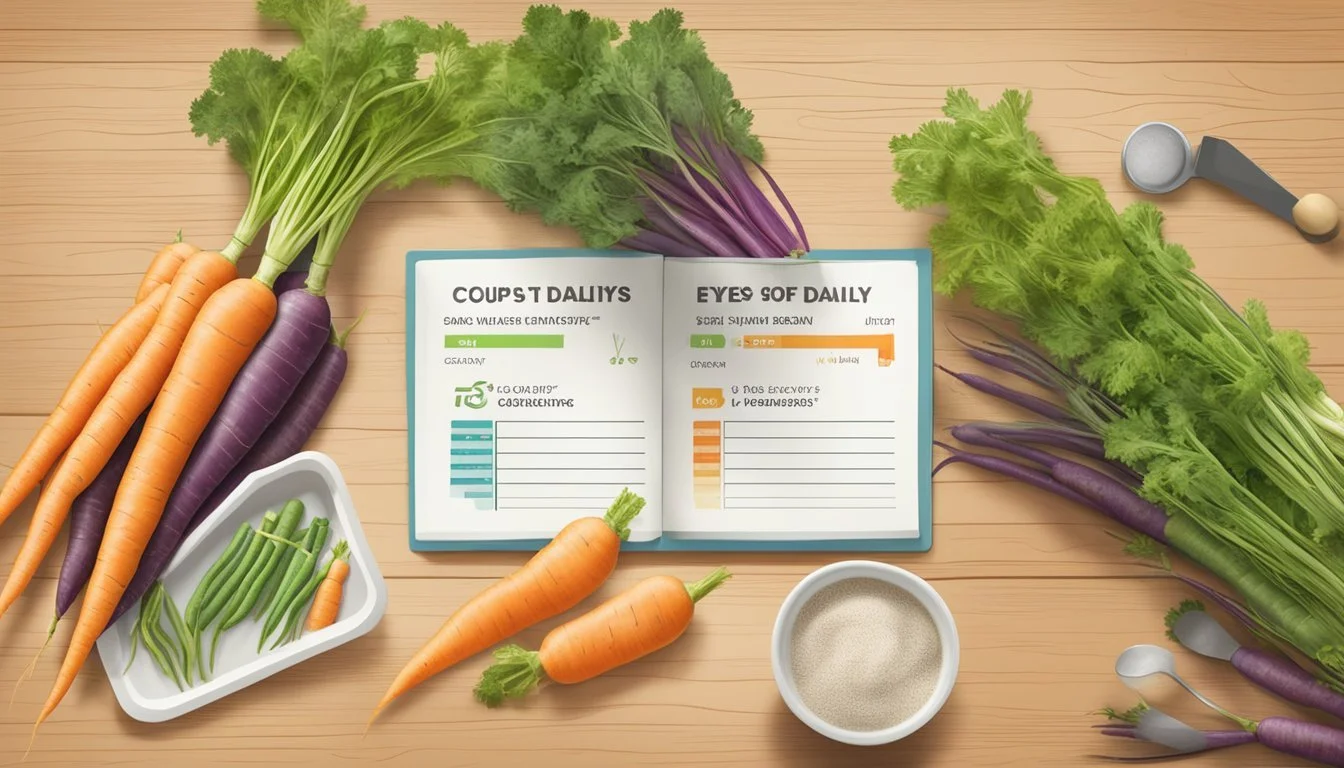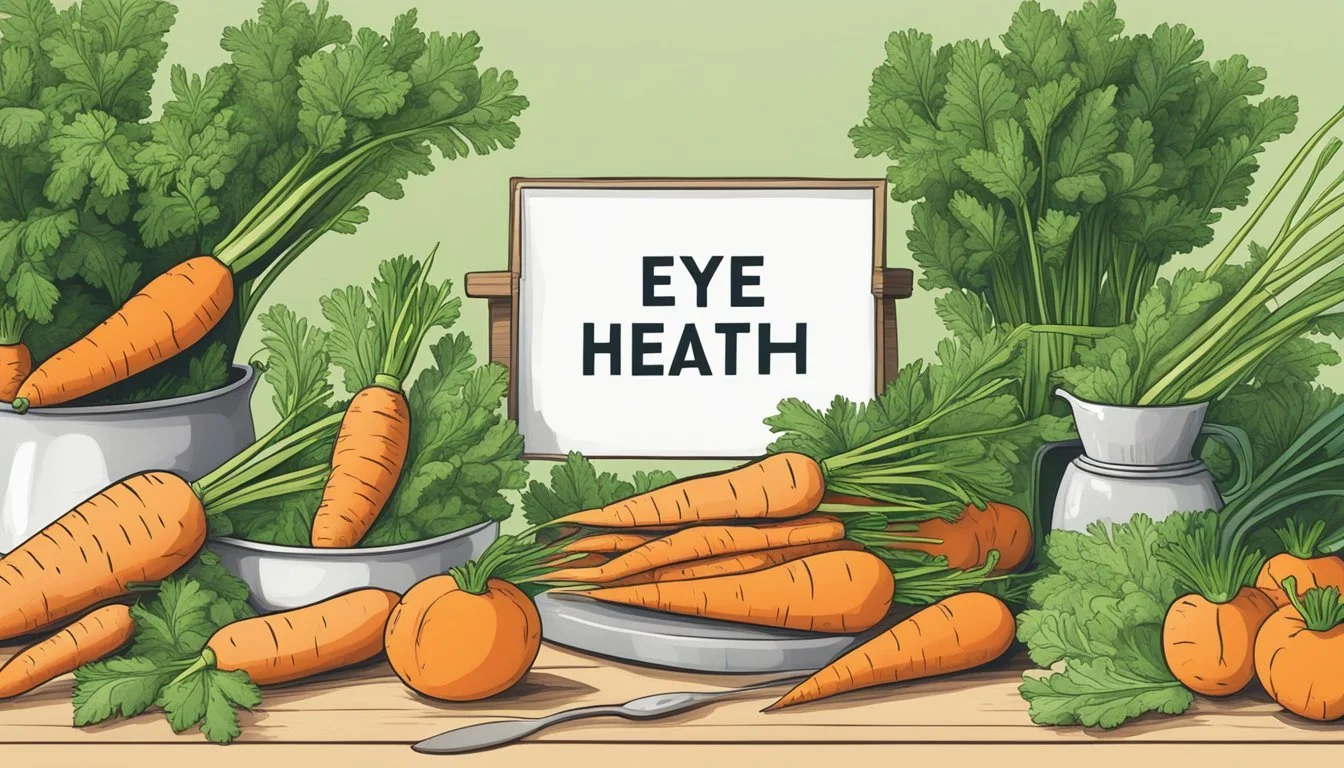How Many Cups of Carrots Optimally Support Eye Health?
Maintaining eye health is a concern for many, and dietary choices play a significant role in supporting vision. Carrots, in particular, have long been associated with promoting eye health. This connection primarily stems from the presence of beta-carotene—a pigment found abundantly in carrots that the body converts into vitamin A, an essential nutrient for maintaining good vision.
While it's a widespread belief that consuming vast amounts of carrots can drastically improve eyesight, a balanced approach is more beneficial. Research suggests incorporating at least a half-cup of chopped carrots or one medium carrot into a daily diet can contribute positively to eye health. This amount is sufficient to provide a valuable dose of beta-carotene, which aids in protecting the eyes from conditions such as age-related macular degeneration and cataracts.
Moreover, carrots are not the sole heroes in the quest for healthy vision; they are part of a broader spectrum of foods that support eye health. Carrots also offer other nutrients such as lutein and antioxidants that help prevent damage from free radicals. When consumed as part of a well-rounded diet that includes a variety of fruits and vegetables, they can help maintain optimal eye health and overall wellbeing.
The Importance of Eye Health
Maintaining eye health is essential for preserving quality of life. Eyesight is one of the most relied upon senses; it facilitates daily tasks and allows individuals to engage with their environment. Degradation of eye health, such as vision loss, not only impacts routine activities but also increases the risk of accidents.
There are various eye diseases, including macular degeneration and cataracts, which commonly affect individuals, especially as they age. Age-related macular degeneration (AMD) is notable for causing a loss in the center of the field of vision. Cataracts involve the clouding of the eye's lens, leading to diminished vision. These conditions can severely impair one's ability to see and, consequently, their independence and way of life.
To protect eye health, it is critical to:
Consume a balanced diet rich in antioxidants and vitamins
Wear UV-blocking sunglasses when outdoors
Schedule regular eye exams to monitor eye health
A key vitamin for eye health is Vitamin A, which can be found in carrots. While the effect of carrots on vision is often overstated, they contribute beneficial nutrients like beta-carotene—a precursor to Vitamin A—that supports overall eye health.
Incorporating carrots into one’s diet as part of a holistic approach to nutrition can be beneficial for maintaining eye health. It's not just about the quantity consumed, but also the consistency of a nutrient-rich diet combined with lifestyle choices that support visual well-being.
Carrots and Their Nutritional Profile
Carrots are a nutrient-rich vegetable known for their high vitamin A content, particularly from beta-carotene, and they also boast a variety of antioxidants and essential minerals important for health, especially eye health.
Vitamin A and Beta-Carotene Benefits
Carrots are an excellent source of beta-carotene, which the body converts to vitamin A. This nutrient is pivotal for maintaining good vision, particularly for optimizing night vision and eye health. A single medium-sized carrot provides more than 200% of the average adult's daily requirement of vitamin A.
Fiber and Antioxidants
Carrots provide dietary fiber, which supports digestive health. They also contain various antioxidants, including carotenoids such as lutein and zeaxanthin, which are beneficial for eye health and may reduce the risk of chronic diseases.
Dietary Fiber: Carrots contain about 2 grams of fiber per half-cup serving.
Antioxidants: Carrots have a variety of antioxidant compounds that help protect the body’s cells from damage.
Minerals and Other Vital Nutrients
Beyond fiber and antioxidants, carrots contain several other vital nutrients:
Vitamin C: Contributes to the proper functioning of the immune system.
Vitamin E: Acts as a powerful antioxidant to help protect cells.
Zinc: Essential for wound healing and immune function.
Minerals: Carrots include calcium and potassium, which are important for bone health and maintaining normal blood pressure, respectively.
Dietary Recommendations for Eye Health
Maintaining eye health is essential, and certain foods can be particularly beneficial for this purpose. Here are some specific dietary recommendations to consider.
Carrot Intake and Serving Size
Carrots are rich in beta-carotene, an antioxidant that is vital for eye health. One serving of carrots, which is equivalent to one medium-sized carrot or half a cup of chopped carrots, should be integrated into the daily diet to support good eyesight.
Balancing Your Diet
A balanced diet is crucial for eye health and should include a variety of fruits and vegetables. Aim for at least 5 servings of fruits and vegetables daily. This includes dark leafy greens like spinach, kale, broccoli, and collard greens which are high in vitamins and antioxidants.
Other Foods for Eye Health
Beyond carrots and leafy greens, include fish like salmon, mackerel, tuna, and herring that are high in omega-3 fatty acids. Citrus fruits for vitamin C, eggs for lutein, and nuts and seeds for vitamin E also contribute to a robust eye-healthy diet. However, consumption of red meat should be moderate due to its association with potential adverse health outcomes.
Lifestyle and Its Impact on Eye Health
A person's lifestyle choices can significantly affect their eye health. Specific habits contribute to the overall well-being of the eyes, while others can put eye health at risk.
Exercise and Eye Health
Regular exercise is pivotal in maintaining good eye health. Studies indicate that physical activity can reduce the risk of age-related macular degeneration by up to 70%. Exercise also helps in controlling conditions like diabetes and high blood pressure, which can lead to serious eye conditions if left unchecked.
Avoiding Harmful Habits
Several lifestyle habits have been identified as harmful to eye health. Smoking, for instance, can double the chance of developing cataracts and triples the risk of age-related macular degeneration. Additionally, excessive screen time can lead to digital eye strain, and exposure to blue light might affect vision. Wearing sunglasses is important to protect the eyes from the harmful effects of UV rays.
Individuals should be aware that maintaining a healthy lifestyle can play a crucial role in preserving their eye health, alongside following a balanced diet rich in nutrients beneficial for the eyes, such as those found in carrots.
Understanding Eye Conditions
Proper nutrition is one key element in maintaining eye health and potentially mitigating the risk of certain eye conditions. This section explores common eye issues and the importance of professional consultation.
Dealing with Common Eye Issues
Common eye conditions such as macular degeneration and cataracts can lead to vision impairment and, in severe cases, vision loss. Macular degeneration is a condition typically affecting individuals over the age of 50 and is a leading cause of blindness. The macula, the central part of the retina, deteriorates over time, affecting central vision. Cataracts, on the other hand, are characterized by the clouding of the lens of the eye, which can also deteriorate vision.
To maintain eye health and manage conditions, individuals may incorporate foods high in vitamin A and antioxidants into their diet. Foods rich in these nutrients support overall eye health and may be beneficial for night vision and preventing or slowing the progression of some eye diseases. It is also essential for individuals to keep their eyes hydrated to avoid dry eyes, which can cause discomfort and affect vision clarity.
When to Consult an Eye Doctor
Regular check-ups with an eye doctor—either an ophthalmologist or optometrist—are crucial for early detection and management of eye conditions. Individuals experiencing symptoms such as persistent dry eyes, blurry vision, difficulty with night vision, or any sudden changes in sight should schedule a consultation. An eye doctor can diagnose issues and provide treatment options, which might include prescription eyewear, medications, or surgery, depending on the condition severity.
For those at higher risk of eye conditions, such as people with a family history of eye diseases, or those with diabetes, hypertension, or who are aging, proactive examinations are particularly important. These check-ups can help in the early detection and treatment of conditions that might otherwise lead to significant vision loss.
How to Prepare Carrots for Maximum Benefits
Preparing carrots in certain ways can enhance their nutritional benefits, particularly for eye health. Proper cooking methods can increase the availability of key vitamins, while innovative recipe ideas can integrate carrots into daily meals with ease.
Cooking Methods
One should consider cooking carrots to break down the cell walls, making certain nutrients like beta-carotene more accessible. This can be particularly beneficial for eye health, as beta-carotene is converted into vitamin A in the body, which is crucial for vision.
Roasting: Place carrot slices on a baking sheet, drizzle with a minimal amount of oil, and roast until tender. This process caramelizes the natural sugars and brings out a rich, sweet flavor.
Boiling: Cook carrots in boiling water until they are soft. However, it's important to not overboil, as it can lead to a loss of nutrients. To retain most of the vitamins, one can keep the cooking time short.
Experts generally recommend eating carrots in moderation due to their natural sugar content. However, both cooking methods, if done properly, can make carrots a healthy addition to one's diet, be it as a snack, side dish, or part of soups and salads.
Recipe Ideas
Carrots are versatile and can be incorporated into a variety of recipes that can act as a vehicle for both taste and nutrition. They can be served as a healthy snack or used as a flavorful addition to a range of dishes.
Snack: Serve raw carrot sticks with hummus for a crunchy and nutritious snack packed with flavor and fiber.
Side Dish: Add honey-roasted carrots as a side to a main meal, bringing in a sweet note with an added nutrient kick.
Soups and Salads: Incorporate boiled carrots into soups for a softer texture or shred raw carrots into salads for a fresh, crisp element.
By using these cooking methods and recipe ideas, one can ensure that the carrots they consume are not only delicious but also optimized for the best possible nutritional benefit.
Potential Risks and Considerations
While carrots are beneficial for eye health due to their high vitamin A content, overconsumption and lack of dietary balance have associated risks that individuals should keep in mind.
Carotenemia and Excess Carrot Intake
Carotenemia is a condition characterized by yellowing of the skin, caused by high levels of carotene in the blood. This can occur when one eats too many carrots. Although carotenemia is not harmful in itself, it indicates an overconsumption of carrots which can lead to an imbalance in nutrients.
Balanced Diet and Portion Control
A balanced diet is crucial for overall health. Consuming carrots as part of a diverse diet ensures that one gets a variety of nutrients. Monitoring overall calorie and sugar intake is also important, especially for those managing weight loss or blood sugar levels. Carrots, in moderation, should complement other foods in one's diet rather than dominate it.
Additional Benefits Beyond Eye Health
While carrots are famed for supporting eye health due to their vitamin A content, they confer additional health benefits. They play a role in a balanced diet contributing to overall well-being, including enhancing skin health, improving cardiovascular health, and supporting the immune system.
Carrots in a Healthy Lifestyle
Integrating carrots into one’s diet contributes significantly to a healthy lifestyle. High in fiber, carrots aid in digestion and can help prevent constipation. They are low in calories, making them an excellent food choice for weight management and a healthy addition to a balanced diet.
Carrots for Skin and Cardiovascular Health
Carrots contain antioxidants such as beta-carotene, which help protect the skin from damage. Skin health benefits from the vitamin A in carrots, as it plays a part in tissue repair and provides a barrier against harmful environmental influences. Cardiovascular health is also supported by the fiber, potassium, and antioxidants in carrots. Potassium helps to control blood pressure, while antioxidants can help reduce cholesterol levels, contributing to heart health. Additionally, the nutrients within carrots bolster the immune system, offering an added layer of defense against illness.
Conclusion
Carrots, rich in vitamin A and beta-carotene, hold merit in a diet designed for eye health. However, they are not a standalone solution. They form a piece of the larger puzzle that comprises a varied and nutrient-rich diet. People aiming for good vision should consider incorporating a range of foods into their daily intake.
Key components of such a diet include:
Leafy greens, like spinach, which offer vitamins and minerals crucial for retina health.
Omega-3 fatty acids, found in fish, important for visual development and retinal function.
Eggs, another source of lutein and zeaxanthin, which can reduce the risk of age-related sight loss.
Citrus fruits and berries, packed with vitamin C, an antioxidant playing a role in eye health.
It's not the quantity of carrots alone that promotes eye health but the consistency of maintaining a balanced diet. Eating carrots as part of a colourful plate ensures one receives a symphony of nutrients needed for a healthy lifestyle.
Regular eye check-ups and protecting eyes from excessive strain and UV light are also critical practices. As each individual is different, it's advisable to consult with healthcare professionals for personalized dietary advice tailored to one's specific health needs. The synergy of these elements fosters the best environment for maintaining eye health and good vision.







